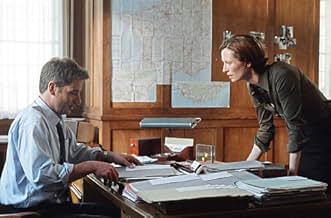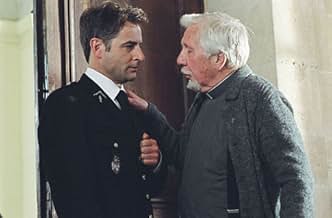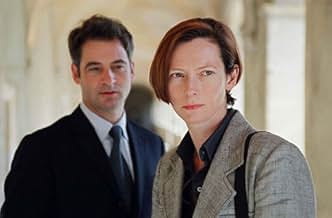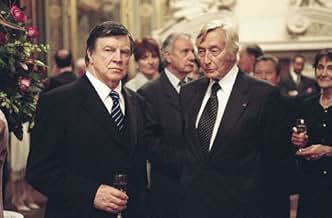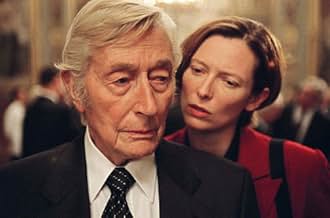AVALIAÇÃO DA IMDb
6,2/10
5,7 mil
SUA AVALIAÇÃO
Adicionar um enredo no seu idiomaTale of a former Nazi executioner who becomes a target of hitmen and police investigators.Tale of a former Nazi executioner who becomes a target of hitmen and police investigators.Tale of a former Nazi executioner who becomes a target of hitmen and police investigators.
- Direção
- Roteiristas
- Artistas
- Prêmios
- 4 vitórias no total
David de Keyser
- Dom André
- (as David De Keyser)
- Direção
- Roteiristas
- Elenco e equipe completos
- Produção, bilheteria e muito mais no IMDbPro
Avaliações em destaque
Your comments will be displayed as follows: A good adaptation of Brian Moore's thriller novel, director Norman Jewison's "The Statement" has its ups and downs.
Michael Caine, who has played many English roles as well as being an American abortion providing doctor, now takes on elderly Frenchman Pierre Brossard, once a shining star of the toady Vichy police force without which the Nazis could never have murdered some 77,000 French Jews. A small percentage of the Holocaust toll but not an unimportant one. Among other acts he participated in the roundup and murder of seven Jews. Such an incident was the basis for the novel.
A man who may belong to a Jewish revanchist organization is killed by Brossard before he can shoot the wheezing, cardiac condition-afflicted former right-hand helpmate for the SS. He's been sheltered for forty years by members of the Catholic clergy.
Tilda Swinton is Judge Levy assigned along with Jeremy Northam, a French army colonel, to find and bring Brossard to trial based on a new law reviving prosecutions against those who committed crimes against humanity. Actually, every important actor in this film except for Charlotte Rampling, who has a small role as Brossard's wife, is English. I'm surprised the French actors' union didn't raise a stink.
This is a chase film with Judge Levy and her colonel either warm or hot on the trail of Brossard who goes from monastery to monastery receiving food, money and help. (In France a judge has vast investigative authority and can and does direct inquiries so the director could credibly have Swinton going from city to city. Imagine Judge Judy flitting about in a chopper ferreting out facts.) At times I thought I was watching a travelogue about the abbeys of Gaul.
There are, of course, hints of a dark conspiracy reaching beyond the Church that I won't reveal.
Caine's peripatetic suspect is deeply religious in the formulaic sense that absolution and ritual salve his conscience but in no way mediate his actions. Caine plays a dirtbag to perfection.
Possibly to avoid charges that the film is unfairly anti-Catholic we're told that
1) the Church is vast, has many subordinate bodies, and those at the top just can't know all that is happening (this defense comes from a gentle librarian-Jesuit priest who also happens to be black, the predominant racial group in the French church).
2) responsibility for aiding genocide by clerics was individual so don't trot out any revisionist Hochhuth/Cornwell/Goldenhagen theories arraigning the Church's leadership.
3) we can't forget that the Resistance was largely communist so maybe there's a rational justification for Vichy's supine collaboration and the very real clerical support for the Nazis if not for every French assisted atrocity.
I despise the mindless Francophobic reaction to France's lack of support for U.S. policy on Iraq. But for too long Vichy and its spineless leaders, Petain and Laval, never mentioned in the film, have gotten a bit of a free ride. So I was happy to see Brossard made frightened as his pursuers close in.
Enjoyable, some nice scenery. Not much more except that Michael Caine is always terrific. And so is Tilda Swinton who brings focused intensity to Judge Levy's unyielding crusade for justice, for that it is.
6/10.
Michael Caine, who has played many English roles as well as being an American abortion providing doctor, now takes on elderly Frenchman Pierre Brossard, once a shining star of the toady Vichy police force without which the Nazis could never have murdered some 77,000 French Jews. A small percentage of the Holocaust toll but not an unimportant one. Among other acts he participated in the roundup and murder of seven Jews. Such an incident was the basis for the novel.
A man who may belong to a Jewish revanchist organization is killed by Brossard before he can shoot the wheezing, cardiac condition-afflicted former right-hand helpmate for the SS. He's been sheltered for forty years by members of the Catholic clergy.
Tilda Swinton is Judge Levy assigned along with Jeremy Northam, a French army colonel, to find and bring Brossard to trial based on a new law reviving prosecutions against those who committed crimes against humanity. Actually, every important actor in this film except for Charlotte Rampling, who has a small role as Brossard's wife, is English. I'm surprised the French actors' union didn't raise a stink.
This is a chase film with Judge Levy and her colonel either warm or hot on the trail of Brossard who goes from monastery to monastery receiving food, money and help. (In France a judge has vast investigative authority and can and does direct inquiries so the director could credibly have Swinton going from city to city. Imagine Judge Judy flitting about in a chopper ferreting out facts.) At times I thought I was watching a travelogue about the abbeys of Gaul.
There are, of course, hints of a dark conspiracy reaching beyond the Church that I won't reveal.
Caine's peripatetic suspect is deeply religious in the formulaic sense that absolution and ritual salve his conscience but in no way mediate his actions. Caine plays a dirtbag to perfection.
Possibly to avoid charges that the film is unfairly anti-Catholic we're told that
1) the Church is vast, has many subordinate bodies, and those at the top just can't know all that is happening (this defense comes from a gentle librarian-Jesuit priest who also happens to be black, the predominant racial group in the French church).
2) responsibility for aiding genocide by clerics was individual so don't trot out any revisionist Hochhuth/Cornwell/Goldenhagen theories arraigning the Church's leadership.
3) we can't forget that the Resistance was largely communist so maybe there's a rational justification for Vichy's supine collaboration and the very real clerical support for the Nazis if not for every French assisted atrocity.
I despise the mindless Francophobic reaction to France's lack of support for U.S. policy on Iraq. But for too long Vichy and its spineless leaders, Petain and Laval, never mentioned in the film, have gotten a bit of a free ride. So I was happy to see Brossard made frightened as his pursuers close in.
Enjoyable, some nice scenery. Not much more except that Michael Caine is always terrific. And so is Tilda Swinton who brings focused intensity to Judge Levy's unyielding crusade for justice, for that it is.
6/10.
I rated this film a 7/10 - with some mixed feelings, because in many ways it was a downbeat film without any kind of neat "message" that would make me feel "a better person" for having seen it. But on second thought I realized that the finished film rather neatly reflects the moral complexity of Brian Moore's novel which it is based upon - and which Ronald Harwood's screenplay follows remarkably closely.
Brian Moore is one of my favorite late 20th century authors, whose work has provided the basis for several other memorable films, most notably "Black Robe." He writes in a Graham Greene-esque mode, his characters often anguished or guilty Catholics or ex-Catholics who struggle to live morally in a degraded and corrupt world. Moore himself appears to have known much about divided loyalties and twentieth century alienation. Although identified as a Canadian author, Moore was born in Ulster - and actually lived most of his later life in California and the South of France. He was clearly fascinated by questions of faith, of good and evil - and he boldly tackled these themes in "The Statement."
In France in the late 1980s and early 1990s there were several prominent cases of Vichy-era collaborators who were belatedly brought to justice by the French court system. Moore was clearly fascinated by the way in which leading members of the French governmental and bureaucratic system continued to hide unpleasant truths about their own pasts - and by the role of the Catholic Church in France in providing refuge and assistance to some individuals who had been involved in the persecution and round-up of Jews.
Michael Caine deserves a great deal of credit for taking on the role of a reprehensible character who nonetheless retains his full humanity. There's never any question in the film about his guilt - he clearly took part in the brutal murder of Jews during wartime. (He's also quite mean to dogs.) And yet he is not without a sympathetic side. It's clear that he's manipulative, but it's also easy to see why many intelligent and devout people of faith would be willing to assist him in his attempt to live "underground" hiding from justice. Caine isn't a caricatured film villain - not like Ralph Fiennes in "Schindler's List" or John Malkovich in "Ripley's Game." But in a real sense, it's all the more disturbing that he seems like "just another innocuous old man."
It was disappointing to me to see that fine performers Jeremy Northam and Tilda Swinton with so little to do in the film - other than looking bewildered as Caine's character continues to elude their grasp. On the other hand, it is quite enjoyable to watch their flirtatious glances with one another. There were many nice touches in the film showing the pleasures of French life - gourmet business lunches, for example, and the beautiful scenery of Provence. Even the supposedly seedy cafes look like they belong in a tourist brochure.
Brian Moore is one of my favorite late 20th century authors, whose work has provided the basis for several other memorable films, most notably "Black Robe." He writes in a Graham Greene-esque mode, his characters often anguished or guilty Catholics or ex-Catholics who struggle to live morally in a degraded and corrupt world. Moore himself appears to have known much about divided loyalties and twentieth century alienation. Although identified as a Canadian author, Moore was born in Ulster - and actually lived most of his later life in California and the South of France. He was clearly fascinated by questions of faith, of good and evil - and he boldly tackled these themes in "The Statement."
In France in the late 1980s and early 1990s there were several prominent cases of Vichy-era collaborators who were belatedly brought to justice by the French court system. Moore was clearly fascinated by the way in which leading members of the French governmental and bureaucratic system continued to hide unpleasant truths about their own pasts - and by the role of the Catholic Church in France in providing refuge and assistance to some individuals who had been involved in the persecution and round-up of Jews.
Michael Caine deserves a great deal of credit for taking on the role of a reprehensible character who nonetheless retains his full humanity. There's never any question in the film about his guilt - he clearly took part in the brutal murder of Jews during wartime. (He's also quite mean to dogs.) And yet he is not without a sympathetic side. It's clear that he's manipulative, but it's also easy to see why many intelligent and devout people of faith would be willing to assist him in his attempt to live "underground" hiding from justice. Caine isn't a caricatured film villain - not like Ralph Fiennes in "Schindler's List" or John Malkovich in "Ripley's Game." But in a real sense, it's all the more disturbing that he seems like "just another innocuous old man."
It was disappointing to me to see that fine performers Jeremy Northam and Tilda Swinton with so little to do in the film - other than looking bewildered as Caine's character continues to elude their grasp. On the other hand, it is quite enjoyable to watch their flirtatious glances with one another. There were many nice touches in the film showing the pleasures of French life - gourmet business lunches, for example, and the beautiful scenery of Provence. Even the supposedly seedy cafes look like they belong in a tourist brochure.
Pierre (Michael Caine) is a Nazi collaborator who has been in hiding for years. He was going to be executed for his deeds but had help escaping decades ago. Now, a judge and colonel are looking for him....as well as some Nazi hunters. But there are two things standing in their way...Pierre is a pretty deadly man and keeps killing Nazi hunters AND Pierre is still getting help from both members of the Catholic church AND government officials. Can they capture the man? And, can the judge and colonel get him to tell them WHO has been helping him?
Although Michael Caine is the star and he's good in the film, he's actually NOT featured all that prominently in the movie. Instead, it shows the various folks coming after him and explaining why...why folks would help a monster like him. Overall, it's a very interesting movie....with a tory that is quite satsifying. One complaint, however, is the lack of French actors in the film...and everyone is supposed to be French. Another is that the film is supposed to be set in the present day (2003) but I think it would have worked better having been set in the 1960s-80s. It's just hard to imagine a man as old a Pierre being such a tough character who's able to kill various Nazi hunters...it just didn't seem realistic as the crimes he committed occurred in 1944...and that would make his character about 80 (more or less) and I cannot imagine any 80 year-old being that dangerous when cornered.
Although Michael Caine is the star and he's good in the film, he's actually NOT featured all that prominently in the movie. Instead, it shows the various folks coming after him and explaining why...why folks would help a monster like him. Overall, it's a very interesting movie....with a tory that is quite satsifying. One complaint, however, is the lack of French actors in the film...and everyone is supposed to be French. Another is that the film is supposed to be set in the present day (2003) but I think it would have worked better having been set in the 1960s-80s. It's just hard to imagine a man as old a Pierre being such a tough character who's able to kill various Nazi hunters...it just didn't seem realistic as the crimes he committed occurred in 1944...and that would make his character about 80 (more or less) and I cannot imagine any 80 year-old being that dangerous when cornered.
7=G=
Michael Caine carries "The Statement" on his back. In spite of an elegant cast, without him as the central character, this convoluted mess of a film wouldn't be worth watching. Telling of an aging French-Nazi war criminal who finds himself on the run and squeezed in the jaws of subterfuge, "The Statement" is too vague in its historical flashbacks, gives poor depth into its sundry characters, breaches realism with a bunch of Brits in France, never makes its agenda clear, and doesn't sort itself out well in the end...to mention just a few of the flaws. The result is a film with a lukewarm reception by critics and the public at large and little reason to watch save another excellent performance by Caine. In spite of all that, I quite enjoyed this flick. Go figure. (B-)
In Norman Jewison's tepid thriller, `The Statement,' English-accented Michael Caine plays Pierre Brossard, an aging French war criminal whose past has begun to catch up with him. In 1944, Brossard, a member of the infamous Vichy regime, not only collaborated with the Nazis, but was personally responsible for the cold-blooded execution of 14 unarmed Jewish Frenchmen as well. Immediately after the war, Brossard was tried and convicted for these offenses, but somehow managed to escape before he could face his deserved punishment. In the years since, Brossard has lived his life underground, finding protection and sanctuary from a branch of the Roman Catholic Church sympathetic to his cause. And although the French authorities have been unsuccessful in their attempts to locate him, Brossard has recently found himself the target of a mysterious group of assassins, possibly members of a secret Jewish organization seeking justice for his yet unavenged crimes against humanity.
The idea of a Nazi war criminal still living in hiding all these years after the end of World War II has the makings of an interesting movie, no doubt, but `The Statement' is not that movie. To the filmmakers' credit, they do at least attempt to present Brossard as a three-dimensional character, a man who, decades after his horrendous crimes, is still seeking redemption through his pious devotion to the Church. Caine, in a deftly balanced performance, manages to make Brossard almost sympathetic while still allowing us to see the `monster' hidden beneath the ravaged soul. Unfortunately, the actor is let down by a screenplay that seems more concerned with tired cloak-and-dagger espionage routines than with a serious study of a fascinating and conflicted character. Even more annoying is the attempt on the part of the film to paint the entire Catholic Church hierarchy as a bunch of diabolical, self-serving individuals who are busy either protecting one of their own at any or all costs or acting out of political expediency rather than true moral conviction. Fans of `The Da Vinci Code' may swallow this anti-Catholic paranoia without question, but the rest of us can merely wonder why the Church hasn't been able to cop a break from the movies since Father Damien kicked the be-Jesus out of the devil in `The Exorcist,' thirty long years ago. I'm certainly no apologist for the Catholic Church (see my review of `The Magdalene Sisters'), but even we non-believers can wonder when we will be seeing a little more evenhandedness and balance in the movies' portrayal of the Church. Certainly there must be SOME well-meaning priest, nun or bishop out there that some filmmaker might consider as worthwhile movie material.
There are other problems with the film as well. Tilda Swinton, as an impassioned judge searching for Brossard, and Jeremy Northam, as a more pragmatic policeman who reluctantly joins her in her pursuit, make an annoying, constantly bickering couple who look, for all the world, like a minor-league Mulder and Scully, minus the attraction and charm. Alan Bates and Charlotte Rampling (reunited from `Georgy Girl,' though the two actors never appear in the same scene together) are wasted in minor roles. And Jewison, who was once so fine a young director, fails to bring any of the scenes in this film to life. One also questions the propriety of taking a serious subject like Nazi atrocities and using it as little more than cheap window dressing for an undistinguished, run-of-the-mill thriller.
`The Statement,' despite another fine performance from the ever-reliable Michael Caine, is a tired, lackluster and cynical exercise, strangely devoid of meaning, conviction and purpose.
The idea of a Nazi war criminal still living in hiding all these years after the end of World War II has the makings of an interesting movie, no doubt, but `The Statement' is not that movie. To the filmmakers' credit, they do at least attempt to present Brossard as a three-dimensional character, a man who, decades after his horrendous crimes, is still seeking redemption through his pious devotion to the Church. Caine, in a deftly balanced performance, manages to make Brossard almost sympathetic while still allowing us to see the `monster' hidden beneath the ravaged soul. Unfortunately, the actor is let down by a screenplay that seems more concerned with tired cloak-and-dagger espionage routines than with a serious study of a fascinating and conflicted character. Even more annoying is the attempt on the part of the film to paint the entire Catholic Church hierarchy as a bunch of diabolical, self-serving individuals who are busy either protecting one of their own at any or all costs or acting out of political expediency rather than true moral conviction. Fans of `The Da Vinci Code' may swallow this anti-Catholic paranoia without question, but the rest of us can merely wonder why the Church hasn't been able to cop a break from the movies since Father Damien kicked the be-Jesus out of the devil in `The Exorcist,' thirty long years ago. I'm certainly no apologist for the Catholic Church (see my review of `The Magdalene Sisters'), but even we non-believers can wonder when we will be seeing a little more evenhandedness and balance in the movies' portrayal of the Church. Certainly there must be SOME well-meaning priest, nun or bishop out there that some filmmaker might consider as worthwhile movie material.
There are other problems with the film as well. Tilda Swinton, as an impassioned judge searching for Brossard, and Jeremy Northam, as a more pragmatic policeman who reluctantly joins her in her pursuit, make an annoying, constantly bickering couple who look, for all the world, like a minor-league Mulder and Scully, minus the attraction and charm. Alan Bates and Charlotte Rampling (reunited from `Georgy Girl,' though the two actors never appear in the same scene together) are wasted in minor roles. And Jewison, who was once so fine a young director, fails to bring any of the scenes in this film to life. One also questions the propriety of taking a serious subject like Nazi atrocities and using it as little more than cheap window dressing for an undistinguished, run-of-the-mill thriller.
`The Statement,' despite another fine performance from the ever-reliable Michael Caine, is a tired, lackluster and cynical exercise, strangely devoid of meaning, conviction and purpose.
Você sabia?
- CuriosidadesAs of April 2019, this is producer and director Norman Jewison's last movie.
- Erros de gravaçãoWhen Brossard searches the killer's wallet, we can see 500 francs banknotes with the head of Pierre and Marie Curie. This kind of banknote was released in 1994 and the action takes place in April 1992.
- Citações
Pierre Brossard: Pray that we meet again... in this world.
- Trilhas sonorasLe Chemin des Forains
Music by Henri Sauguet
Lyrics by Jean Dréjac
Performed by Baguette Quartette
Published by G. Schirmer Inc., administered by Music Sales Corporation
Courtesy of Baguette Quartette
Principais escolhas
Faça login para avaliar e ver a lista de recomendações personalizadas
- How long is The Statement?Fornecido pela Alexa
Detalhes
- Data de lançamento
- Países de origem
- Central de atendimento oficial
- Idiomas
- Também conhecido como
- The Statement
- Locações de filme
- Empresas de produção
- Consulte mais créditos da empresa na IMDbPro
Bilheteria
- Orçamento
- US$ 27.000.000 (estimativa)
- Faturamento bruto nos EUA e Canadá
- US$ 765.637
- Fim de semana de estreia nos EUA e Canadá
- US$ 37.220
- 14 de dez. de 2003
- Faturamento bruto mundial
- US$ 1.079.822
- Tempo de duração
- 1 h 54 min(114 min)
- Cor
- Mixagem de som
- Proporção
- 1.85 : 1
Contribua para esta página
Sugerir uma alteração ou adicionar conteúdo ausente



